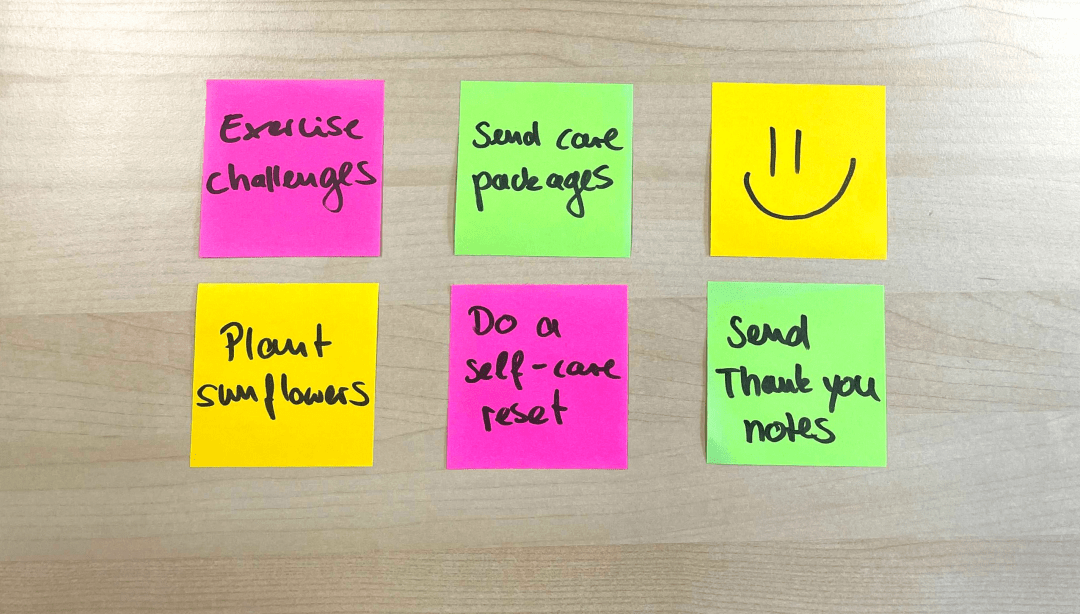How leaders can support their employees' mental health during challenges
Motivating a team isn’t easy
With COVID-19 changing the way that businesses operate, employees are now normally working from home. They are meeting with co-workers and supervisors in a virtual 3D world to stay connected while staying safe. They are sending emails and getting on teleconferencing calls without seeing anyone face-to-face. It requires the motivation to get the job done, especially since employees are required to become self-starters.
As a leader your job is not to manage people or projects -- it’s to manage emotions, including your own. During this really challenging time (understatement of the year!) that can be really intense and since we don’t learn about emotional fitness skills in an MBA or in leadership development programs, you don’t always know what to do.
The first thing you can do is make your and your team’s emotional and mental health your number one priority. You can’t give what you don’t have, and your team members can’t give what they don’t have. If everyone is depleted and overwhelmed it doesn’t matter how many motivating talks you give, things won't change for the better.
I have researched on the topic and gathered a few tips and talks, which I am summarizing hereafter:
Practice emotional awareness and openness
Whether you like it or not, as a leader your emotions have an amplified effect on everyone else. So, begin by practising emotional awareness: Check in with yourself by asking "How am I feeling? What is my energy like?" (Do this the first thing in the morning and before meetings.)
When your emotions vary from the norm (upset, stressed, more tense than usual) acknowledge them openly by telling people a little bit about why you feel that way. You don’t need to write a novel about your feelings -- just share enough so the other person knows what’s up. This reduces stress and wasted energy for people trying to guess why you’re acting differently and gives them permission to share their emotions more openly.
Practice gratitude
During challenges and difficulties, the human brain’s natural negativity bias - being more sensitive to what’s wrong or negative - is in overdrive, making it easy to become overwhelmed with negative thoughts and even hopelessness. Practising gratitude openly is the best way to counter the negativity spiral.
End meetings 10 mins early for a self-care reset
Try this: End a meeting 10-20 minutes early and ask everyone to take that time for a self-care reset. You can suggest that everyone ask themselves: "What is something I can do right now to reset and refuel?" and encourage them to do it. Lead by example and share what you’ll be doing for your self-care reset - and don’t spend that time sending emails or scheduling meetings.
Exercise Challenges
Encouraging employees to stay active by challenging their coworkers. We’ve had a few teams compete in virtual rallies, races, or step challenges using free apps to log steps, distance ran/cycled, etc. Why not see which team has the most steps or ran the furthest distance this week. Exercising together could be a good stress buster and bonding activity.
Sunflower Planting
Another idea might be sending out sunflower seeds to care for and grow as your employees work from home. They can regularly share the progress their sunflowers are making. It's not only a nice little project to focus on but it gives them something to talk about that's not work or Covid. This is a good way of boosting their well-being and brightening their day.
Care Packages
Send care packages to your employees’ homes to help them adjust to remote work. The care packages are tailored for each individual, and they include self-care items such as cosy socks, chocolate, herbal tea, craft kits, puzzles, books, and board games. You can also include some essential office supplies to ensure your employees have everything they need to work remotely.
Mental Health Time
One of our perks is that we give employees up to an hour each day to do something positive for their physical or mental health, such as going on a walk, reading a book, taking an exercise class, or doing a meditation (no admin or work allowed!). Even if commuting times decreased, employees tend to work longer as workspace and private space are blurring. Especially in small teams, it's easy to track mental health activities daily on a virtual whiteboard and check-in each morning to see what each team member is planning to do that day.
Thank You Notes
Keep employee morale high by sending out thank you notes to employees currently working from home. It is a small token of appreciation, but our employees have expressed that they really appreciate this recognition.
Virtual Room
Some companies have assigned a virtual room where people can come to hang out if they feel lonely or have some free time.
Few Quotes to inspire teamwork while working remotely:
Teamspirit is of utmost importance and a strong driver of success. No matter how smart, talented, driven, or passionate we are, our success depends on our ability to build and inspire a team. A successful leader is one who can spur his or her team members to work well together toward a common vision and goals.
I hate meetings, but I love short (seven to 20-minute) huddles to align and motivate the team. One effective way to begin or end a huddle is by sharing a quote.
Here are few quotes from well-known coaches, athletes, business leaders, and authors that will compel you and your team members to work well together:
- "Individual commitment to a group effort--that is what makes a teamwork, a company work, a society work, a civilization work." --Vince Lombardi
- "Talent wins games, but teamwork and intelligence win championships." --Michael Jordan
- "Teamwork is the ability to work together toward a common vision. The ability to direct individual accomplishments toward organizational objectives. It is the fuel that allows common people to attain uncommon results." --Andrew Carnegie
- "Alone we can do so little, together we can do so much." --Helen Keller
- "Remember, teamwork begins by building trust. And the only way to do that is to overcome our need for invulnerability." --Patrick Lencioni
- "None of us is as smart as all of us." --Ken Blanchard
- "Coming together is a beginning. Keeping together is progress. Working together is success." --Henry Ford
- "The strength of the team is each individual member. The strength of each member is the team." --Phil Jackson



